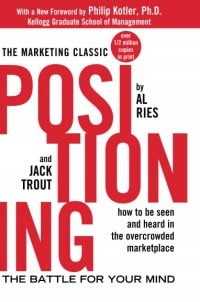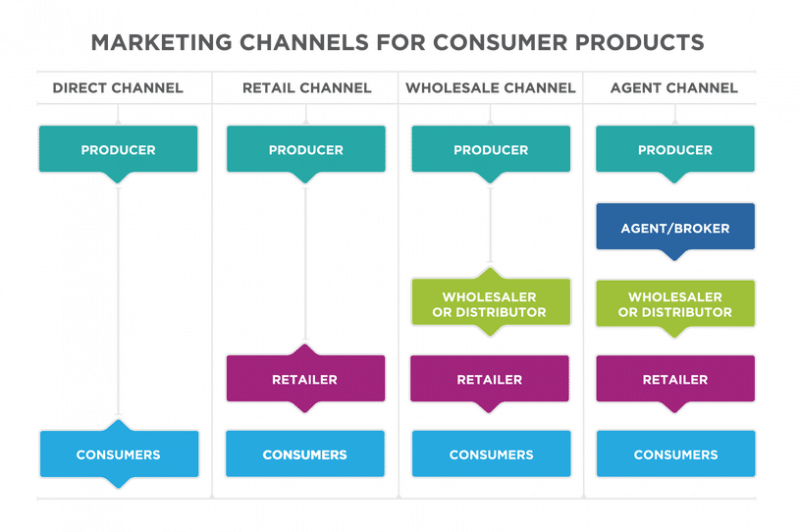Why do your customers buy from you instead of your competitors?
You don’t know?
Well, this means you offer your customers no particular advantage at all, selling the same thing as humdrum Joe across town and Bob’s Discount Widgets two towns over. It also means you’re more than likely always having to compete on price.
The differentiation of your company enables it to achieve a competitive advantage in the market. It sets you apart from your competitors. It’s important to have a competitive advantage especially if your company sells similar products or services to other companies in your market.
To get customers to differentiate your business from your competition, you must determine the most unique benefit or advantage you can offer so that future and existing customers will choose to do business with you.
There’s been a lot of talk about making your company different in the eyes of consumers. Differentiation is important but you might be thinking how do I differentiate?

In their classic marketing book Positioning, Authors Al Ries and Jack Trout explain why developing differentiation is so essential:
“To succeed in our over communicated society, a company must create a position in the prospect’s mind, a position that takes into account not only a company’s own strengths and weaknesses, but those of its competitors as well. Advertising is entering an era where strategy is king. In the positioning era, it’s not enough to invent or discover something. It may not even be necessary. You must, however, be first to get in the prospect’s mind.”
What Ries and Trout are saying is that people spend very little time considering new information—usually just a second or two. So if you want your product or service to have a strong position in the marketplace, you have to come up with a differentiation. Then you have to find a way to communicate that position clearly, so it will be understood in the few moments of attention you are likely to get for it.
Your market has become noisier and more crowded than ever before, customers have overwhelming choices. That’s why standing out from the competition has become imperative for businesses with a long-term vision.
So let me ask you…What’s your differentiation?
There are six essential ways to differentiate your company… these are product, service, channels of distribution, relationships, reputation/image, and price.
However, not all differentiation strategies are equally effective and some methods may be more important to invest in than others in order to stand out from the competition. Read on to learn more about these different strategies and the key advantages associated with each one.
Six Ways to Differentiate Your Company
First, there’s Product Differentiation:
Product differentiation distinguishes the differences of a product to make it more appealing to a particular target market. Product differentiation is the most commonly used by most companies to set them apart from their competition.
You can differentiate your company on…
Features/ Performance/ Efficacy/ Conformance/ Durability/ Reliability/ Warranty
Does your product offer more usable features?
Does it offer better performance?
Does your product meet certain governmental specifications?
Is it durable?
Can your customers rely on it without breaking down?
How about your warranty? For example: Hyundai has a warranty on their cars that’s 10 years, 100,000 miles, the best warranty in the automobile business.
Of course, differentiation depends on customer perception. It’s not how the business owners see his/her own product, it’s how the customer recognizes the product.
90 percent of all new products do not have any distinguishing characteristics. Walk through any supermarket or department store. Most of the products you’ll come across are fundamentally copycat ideas.
2nd… Service Differentiation:
You can differentiate your company on…
Ease of Ordering/ Delivery/ Installation/ Customer Training/ Customer Consulting/ Other Miscellaneous services.
Does your company offer a process that makes ordering easy?
Does it offer delivery? Maybe same-day delivery? Or Free delivery?
Do you offer installation? On-time installation?
Are you training your employees to treat customers better, to handle complaints? To give a delightful buying experience?
How about customer consulting? Who can your customer turn to if they need help or need to troubleshoot a problem? Or just have a question or two.
Do you offer supportive services that help your customer have a better experience, spending their money with you instead of someone else?
Companies that succeed in service differentiation have attentive service employees who make it their job to listen to the customer and specialize in problem-solving. Their attitude is win-win and they follow up to ensure the customer is happy.
To many, the above may seem like the simple components of a business, however, it’s to what degree different businesses value each of these components. One business could concentrate on training their employees and making few mistakes on installation but also make it difficult for customers to order. As with another company, they can excel when it comes to ease of ordering but have complaints when it comes to installation or rude employees.
Your Service is based on Two Factors:
- Performance
- Customer Experience
If your business provides basic services to customers, promising and delivering consistently high-quality services can help you differentiate. A lawn care business for example could establish a reputation if it consistently provides neat trim lawns and gorgeous surroundings. A furniture company can offer the convenience of same-day delivery. Your customer’s experience dealing with your company always is based upon their perception of your business or brand. Every interaction a customer has with your company, from clicking your website to talking to customer service impacts your reputation.
Service is based on outcome:
The outcome of your service is critical to success in service quality differentiation. Any type of business, whether it’s a product- or a service can differentiate itself with a delightful performance outcome. This involves taking the steps necessary to resolve customer problems or fix product malfunctions. Companies that succeed in service differentiation more than likely have well-trained employees to ensure the customer is happy with the outcome.
 Talk about differentiating your company through service… If you haven’t heard “The Lost Giraffe Story” it’s a must.
Talk about differentiating your company through service… If you haven’t heard “The Lost Giraffe Story” it’s a must.
(Brilliance in the making)
You could learn a lot about customer service from a giraffe? Well, a stuffed giraffe actually. This happened several years ago. A young boy left his stuffed giraffe at the Ritz-Carlton Hotel on Amelia Island. Wanting to calm his distraught child, the father reached out to the hotel to see if they had found the stuffed animal. They had…and returned it to the family in short order, along with a complete photo journal of the animal’s extended “vacation” away from the family. Rather than simply putting the toy in a box and shipping it off, the Ritz went above and beyond to make sure this child’s cherished possession was as dear to them as it was to the boy who lost it.
You can read more about Joshie the Giraffe and his “vacation” here.
Third, maybe your company has a Channel Differentiation:
A company can also gain a competitive advantage by what is known as channel differentiation. This means that a company differentiates itself by differentiating its channels of distribution by transferring goods from the point of manufacturing to the point of customer purchase.
You can differentiate your company on…
Coverage/ Expertise/ Performance
Does your company serve wider coverage than your competitors? Do you go where your competitors don’t go? Or won’t go?
Are you known as the expert in your industry?
What about performance? Do you do what you promise you’re going to do? Or maybe go a little more than what you promised?
Distribution can provide coverage or availability, immediate access to expertise, and greater ease of ordering along with higher levels of customer or technical support.

4th, How about Relationship Differentiation:
Relationships with employees, associates, or team members with customer focus can provide your company a differentiation through building relationships.
Are your employees competent?
Are your employees courteous with your customers?
Do your employees possess a degree of credibility?
Are your employees reliable? Can you count on them?
Are your employees responsive to the customer’s needs? How about when a customer complains? Do they know how to handle the problem that satisfies the customer?
Do your employees communicate well? Not only with customers but also within the company to other departments?
There are 3 levels of relationship marketing where the customer is the main focus.
- Level 1: Customizing the Customer.
Customization refers to adapting to your customer’s personal needs. The more you customize your service to the customer’s needs the better.
- Level 2: Rewarding Customer Loyalty
Customer Loyalty refers to when a customer buys from your company on an ongoing basis or only purchases from your company.
- Level 3: Connecting with high-value customers on a personal level and more often.
Connecting on a personal level refers to connecting to your best customers through…
-
- Empathizing
- Showing interest
- Listening
- Being there when your customers need you
- Keeping your promises
- Enjoying a good laugh
- Showing excitement
Being together in the process. (They don’t want to feel alone.)
This avenue of differentiation is closely related to service but focuses specifically on people. Customers want to conduct business with real people, not an institution or automated recordings. Building this kind of relationship takes time, but can establish your company as a highly differentiated company in the market.
5th, Image/ Reputation Differentiation
What’s the perception your customers have in their minds of your company?
Do you educate your customers on how to properly use the products you sell?
Is communication open and friendly?
Does your advertising reflect a heart-felt message that’s relevant to what your customer wants and needs?
Some businesses set themselves apart by their image. Normally, image is created by other forms of differentiation such as high levels of service, superior product quality, or performance.
Image is often controlled and managed by symbols used in communications, advertising, and all types of media — written, digital, and audio, as well as brick and mortar storefronts. This is not limited to retail businesses only.
Your image or your business reputation can be a tough hill to climb.
A company’s brand does not automatically differentiate a company from its competitors. The brand has to stand for something of value to the customer, to communicate something unique and different from its competition. Often that takes a big budget. Branding is much more than just creating a logo, it’s the persistent communication of your value in a meaningful and effective way. It’s positioning your value in the customer’s mind.
However, businesses with a limited marketing budget should not try to pull off a large branding campaign. The most effective strategy is to move away from a branding strategy and focus more on a customer-focus strategy. Select your most loyal customers, those of which buy from you constantly. Focus all of your budget on these customers, giving them exactly what they want and do it better than anyone else. You will increase the share of their business and they will become your ambassadors, giving you great word of mouth and raving reviews on social media.
6th, Price Differentiation
Is what you sell the lowest in price? Is it the highest? Customers determine price according to value.
Competing on price requires that every customer has a different outlook on value. What would they be willing to pay for your product?
Your price doesn’t always have to be the lowest but it always must be perceived as the best value for the money. Often having the product in stock will outweigh the price.
“Oh look they have one on the shelf, it’s a few dollars more but we don’t have to keep running around looking for it.”
Can you offer a better price if your customers buy in bulk? Or offer a free service to customers who pay a higher premium to offset the price?
Can you offer the same product for a lower price by scaling back the packaging for your discount buyers?
Price differentiation recognizes that the value of goods and services is a biased reality.
Factors To Consider For Price Differentiation: Price difference mostly benefits you when it meets at least one of the following criteria:
- Valuable: the perceived benefit exceeds the cost
- Important: delivers a benefit critical to success
- Distinctive: unique or offered in a distinctive way
- Superior: better technology, faster, more effective
- Emotional: ties to a core emotion — love, hate, desire
- Communicates: understood and visible
- Preemptive: cannot be easily copied
- Affordable: customers can pay the higher price
- Profitable: contribution (margin times volume) exceeds the cost of the difference.
- Six Ways to Differentiate Your Company and Win Over Your Competition. - April 22, 2021
- The Real Way To Build Your Business - April 5, 2021
- To Question Your Integrity? How To Handle Criticism From The Tough Client. - October 22, 2020
